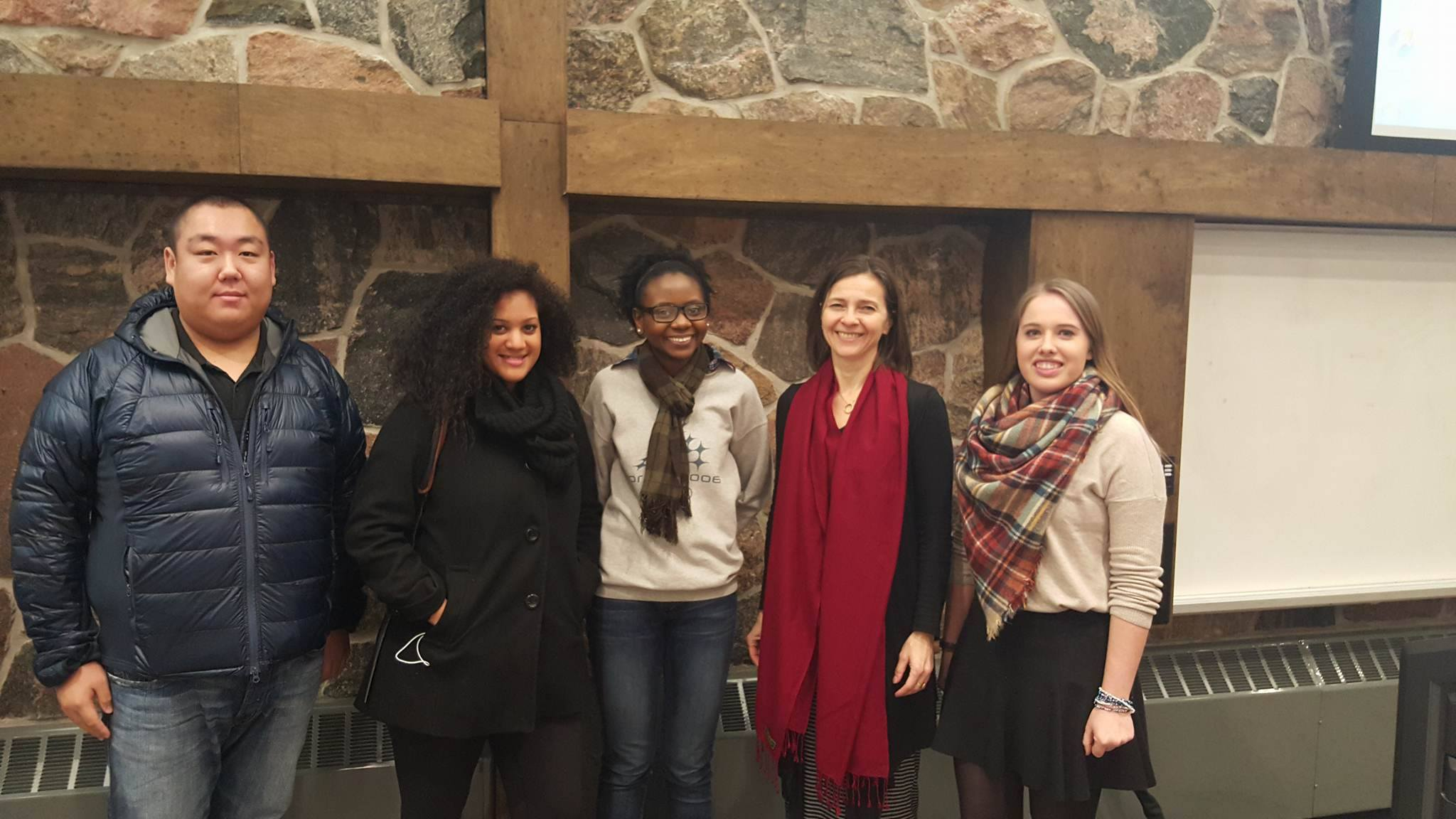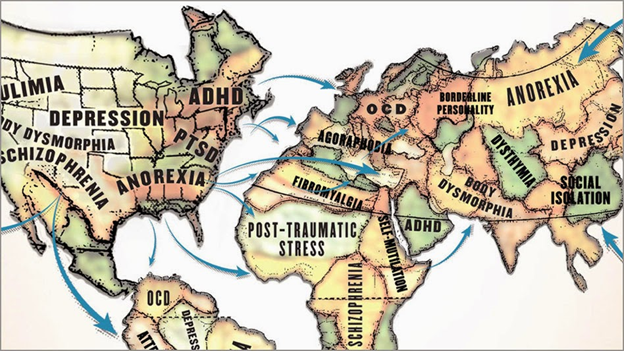Written by: Danielle Hak, Calyssa Burke, Zhimin Cui and Stacey Ibanda

In photo (Left to right) Zhimin Cui, Calyssa Burke, Stacey Ibanda, Micheala Hynie, Danielle Hak
We were honored to invite Dr. Michaela Hynie to deliver an unforgettable guest lecture on Incorporating Culture into Thinking about Social Community based on Health Interventions to our International Development 101 class. Dr. Michaela Hynie is a professor of Psychology in the Faculty of Health, at York Institute for Health Research, and Center for Refugee Studies at York University (2014, York University Health Research Blog).
Did you know that 1 in 4 people are impacted by mental health? (Wold Health Organization, 2001). Often stigmatized and neglected, professionals, friends and family in the current world are finally attempting to bring to light issues of mental health. However, around 25-50% of people in high income countries and 76-80% of people in low income countries are not being given the proper care they need to their mental health issues. Surprisingly, perinatal mental health problems are hugely prominent around the world with 20-60% of perinatal mental health problems not being recognized nor treated. Ultimately, with being one of the largest areas of difficulty in one's social environment, it is becoming increasingly important to address, start an open conversation and treat those suffering from various mental health concerns worldwide.
The world is filled with many unique cultures, which have a large impact on the lives of its members. As development students it is very important to understand culture when addressing development issues. Culture was defined by Dr. Michaela Hynie as any information acquired from other members of one's species through social learning that can affect an individual’s behaviour. Understanding culture is very important when studying issues surrounding mental health as well as community development. Cultural factors can contribute to stress, shape the ways of dealing with distress, determine ways of coping with mental health or even influence what types of mental health issues are more prevalent in different areas.

When addressing the issues of mental health, Dr.Hynie addressed the importance of building social support. In developing communities, social support is necessary to be able to advance and flourish. Although social support is universally necessary it will look very different depending on culture. It is crucial to understand what a culture needs to be able to provide that support. It is important that people who are a part of the culture are involved in these discussions because they understand best what the members require.

Dr. Michaela Hynie was a member of a research team working in Rwanda. Rwanda is located in Eastern Africa and has a population of 10.5 million with more than half being women. As a matter of fact, it has the highest representation of female politicians. Rwanda is perhaps most well-known for the 1994 genocide which was 100 day conflict between the Tutsis and the Hutus. The genocide left a slew of development problems, in its wake among them mental health. After having the social fabrics of their society destroyed, Rwandans grappled onto how to get back to normal life. High instances of PTSD and depression were reported in the region.
Despite its rough past, Rwanda has done a marvelous job of rebuilding and recovering. One of the main things that Dr.Michaela Hynie discussed was the use of social support to rehabilitate the community. The government went back to traditional practices such as "Ubudehe" which refers to collective action to combat poverty. This was done as a way to promote resurgence in the population and illustrates how culture plays an important role in the process of development.
Overall Dr. Michaela Hynie’s presentation illustrated the importance of community development as it improves mental health for individuals and the well-being of the community.
For More information:
United Nations Enable | Disability
References:
Apter, G. (2011). Perinatal Mental Health. Ovidsp.tx.ovid.com. Retrieved 6 February 2016 from http://asscenihotosidea.blogspot.com/2015/12/rwanda-scenery-photos.html
World Health Organization. (2001). Retrieved February 12, 2016 from https://www.who.int/news-room/detail/28-09-2001-the-world-health-report-2001-mental-disorders-affect-one-in-four-people
Photo Credits:
Open source photo of Rwandan landscape retrieved from http://asscenihotosidea.blogspot.com/2015/12/rwanda-scenery-photos.html
Open source photo of Global Mental Health retrieved from http://strangestofloops.blogspot.com/2014/10/global-mental-health-global.html